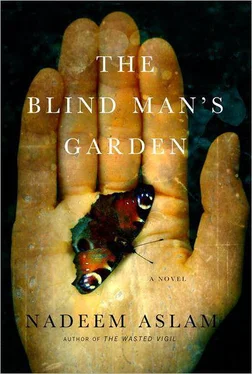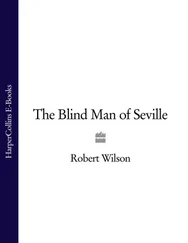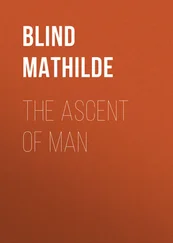‘Mikal, we have to go back and bury the dead man.’
‘I know.’
To look for more wood Jeo stands up and walks over to the high piles of rocks that lead to the depths of the cave and there he finds an electricity generator and a cardboard box filled with glass light bulbs. When he returns carrying the box, Mikal is surrounded by a group of armed men, dressed in black like beings provoked out of the absolute darkness. One of them motions with the gun for Jeo to join Mikal.
‘What is that in your hands?’
‘I just found these. I don’t know what they are.’
One of the men examines the contents of the box while the others watch Jeo and Mikal with slow movements of their eyes.
‘Are you trying to send signals to the Americans?’
One of the men says that he had recently seen a string of electric light bulbs laid out on a plateau on the outskirts of his village, hooked to a gas-powered generator. The bulbs lay glowing on the ground and then a helicopter had landed, guided by them, and several white men had emerged, wearing jeans and carrying computers and guns and heavy black canvas bags. They had gone away with the warlord who controlled the village — a Taliban loyal who is now with the Americans. The black canvas bags were no doubt full of dollars with which he was bought.
‘We have nothing to do with any Americans,’ Mikal says.
Jeo could have shown them his medical supplies but they are in the van. He tells them that he is training to be a doctor and is here to help his Afghan brothers and sisters.
‘So which of you is Jeo and which Mikal?’ one of the men asks, looking at them carefully. ‘We were told one of you knows the language of stars.’
‘How do you know our names?’
‘We met the convoy you were with. Now you will travel with us.’ Half the light from the coloured mirrors scattered on the cave wall has been obscured by the black the men are wearing.
Outside there is a glowing shiver of the unrisen sun in the darkness to the east and the morning star has climbed higher. Trucks are parked among the boulders and their occupants get out and embrace Jeo and Mikal, calling them ‘brothers’. Everyone says the predawn prayers with their faces turned to the dense blackness in the west.
A long fan of light comes from the sky when the sun rises and they get into a truck and the convoy moves onwards. The metal roof is perforated with a line of evenly spaced bullet holes, where one of the boys had madly opened fire at an American helicopter overhead, unable to contain his rage.
‘How old are you?’ Mikal asks the boy next to him.
‘Sixteen.’
Mikal reaches out and feels his throat for the Adam’s apple. ‘You are twelve. Thirteen at most.’
*
Full of courage and the sense of duty, the new boys are fighters and veterans of various jihad training camps. They have a feeling of relief and a subdued stimulation in them at the prospect of holy combat drawing near, their clothes marbled with sweat and dust, their shoes in disrepair, their skins deeply weathered. They talk earnestly about the Crusades and jihad, of legendary weapons and famed warriors, and they are from all parts of Pakistan and the wider Muslim world, Egyptians, Algerians, Saudi Arabians and Yemenis, between the ages of sixteen and twenty-five, recruited through a fatwa issued by the Saudi cleric Sheikh al-Uqla, a fatwa praising the Taliban for creating the only country in the world where there are no man-made laws. There are Uzbeks and Chechens also and a group from northern England, several of them with turbans wound around baseball caps so they are easy to remove. Among them though there is one Pakistani who just wants to catch an American soldier and collect the bounty being offered by Osama bin Laden, one hundred thousand dollars per soldier, more than a million rupees.
*
Interrupting the journey only to say the noon and afternoon prayers, they travel all day and in the evening they arrive at a mud-built village on the lower slope of a hill. The fort at the top is the area’s Taliban headquarters and they drive through the village towards it, the speed reduced due to the narrowness of the streets, men and women withdrawing to either side on seeing the Taliban vehicle, hugging the walls with eyes lowered. The doors and windows of many houses have had splinters torn out of the wood by bullets and in one place a number of people have been lined up and shot in recent days, their blood remaining in bursts on the walls. One of these is at the height of a child’s head.
A grey dog yaps at the truck and a Taliban soldier jumps down and delivers it an expertly placed kick under the jaw and then, when it recovers and snarls back, shoots it dead with his AK-47, the truck coming to a sudden stop and the driver leaning his head out of his window to assess the situation. He tells the soldier to get back in but just then a small metallic sound issues from the burka of one of the women standing against a wall — a bangle or an earring. An item of audible jewellery. The driver reaches under his seat and takes out a leather whip with dozens of coins stitched along its length. He gets out with the two-yard-long instrument and, enraged, demands to know who it is that is wearing the loud jewellery, attracting the men of faith by her wiles.
‘Who is it?’
The women huddle together and the driver whips this mass of dirty blue fabrics several times, running around to aim at whoever cries out, while with the stock of his AK-47 the other soldier tears open the head of the man who dares to intervene.
‘Are you a Muslim or aren’t you? Does Allah forbid women from such things or doesn’t He?’
The fighters in the truck view the punishment with a sense of justice on their faces and one of them beseeches Allah to prevent everyone from sinning.
Mikal touches Jeo’s sleeve. ‘To your left.’ His lips barely move.
Jeo glances in that direction but is not sure what he is looking for.
‘Did you see him?’ Mikal whispers.
Jeo shakes his head.
Mikal looks quickly. ‘He’s gone.’
‘Who?’
‘An American.’
*
The white man was in an upper-storey window on the other side of the street. It was a fleeting glimpse, and suddenly the air had become much colder for Mikal. They are here. They are organising an attack on the Taliban headquarters — the place where he and Jeo are being taken.
As they move on towards the fort, another thin dog appears and follows them for a distance and then stands watching them. There are tank tracks in the dust leading out of the fort’s tall arched gate. The truck goes through it and stops before a complex of buildings inside, the gate closing behind them, and they climb out stiff-limbed.
Jeo is taken away immediately to tend to a group of injured Taliban soldiers. His eyes hot from fatigue, Mikal assesses the boundary wall — it is at least thirty feet high and twenty feet thick, and along the parapet there are holes for guns, wide enough to accommodate the swing of a barrel.
He doesn’t see Jeo until everyone gathers for the night prayer at the fort’s mosque.
‘There are just over a hundred and twenty men here,’ Mikal tells him. ‘There were many hundreds until two days ago but they have gone to reinforce an important battle a few villages away, taking tanks and armoured vehicles.’
‘Tell me about the American.’
‘This place will be attacked.’
‘I heard a few al-Qaeda members were here,’ Jeo says. ‘But they disappeared very soon after 11 September.’
‘We could try to steal a truck.’
The fort is — it must be — the most hated and feared place in the region. The people in the village will show no mercy when they come in with American reinforcement and weaponry.
Читать дальше












